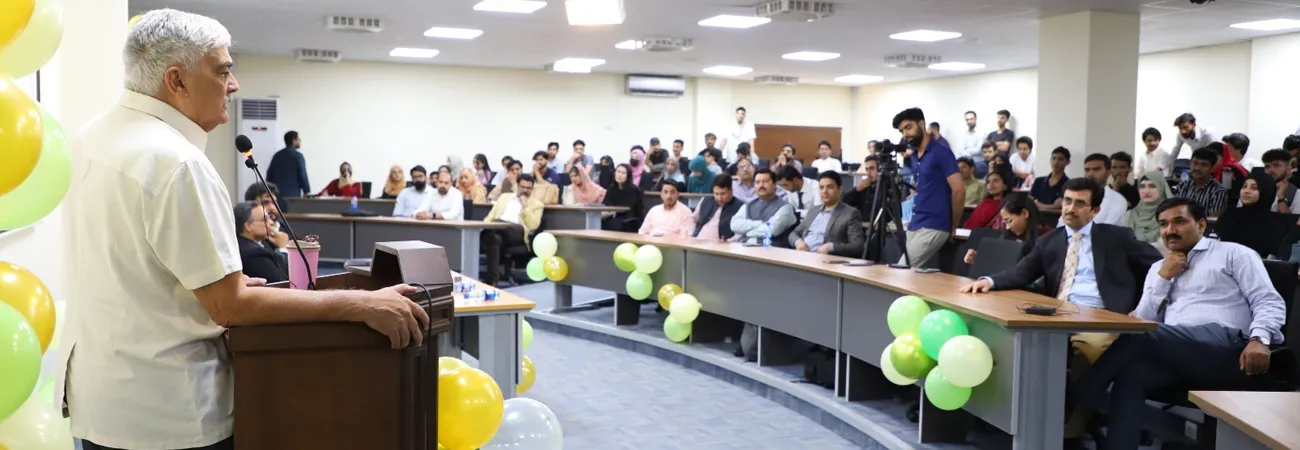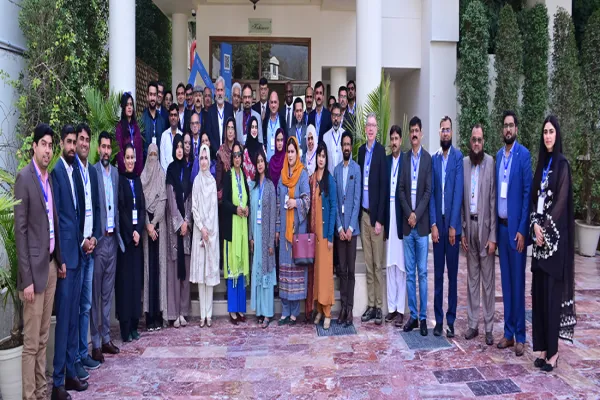i NEWS PAKISTAN
• “On Money” culture, which forces consumers to pay black-market premiums due to limited vehicle availability. This phenomenon costs consumers an estimated PKR 30 - 34 billion annually.
• Transitioning to electric vehicles (EVs) will not only reduce Pakistan’s fuel import bill but also help combat worsening air quality in the country: VC PIDE Islamabad, October 10, 2024 - The Pakistan Institute of Development Economics (PIDE) successfully launched its much-anticipated new book, “Driving Backwards: What is Wrong with Pakistan’s Automobile Industry?” at an event held at the National University of Modern Languages (NUML) in Islamabad today. The book provides a comprehensive analysis of Pakistan’s underperforming automobile sector and presents a roadmap for its revival and transition to future.
Dr Usman Qadir, Senior Research Economist at PIDE presented the book’s key insights and engaged in discussions about the long-standing challenges facing the sector. He emphasized the need for Pakistan to move beyond protectionist policies and instead focus on integrating its auto industry into global value chains to boost competitiveness and innovation. Pakistan's Automobile Industry is still faced with the same problems as many decades ago. Poor quality, high priced, technologically lagging vehicles with low production volumes are common features of the automobile market in Pakistan. PIDE recommends to tax automobile manufacturers at higher rates unless they meet export targets. This would incentivize companies to expand into global markets and stimulate growth in a sector that has seen little progress in over half a century.
Dr. Nadeem Ul Haque, Vice Chancellor PIDE in his keynote speech expressed transitioning to electric vehicles (EVs) will not only reduce Pakistan’s fuel import bill but also help combat worsening air quality in the country. He also highlighted that R & D is the backbone of Global Automobile Industry but completely lacking in Pakistan. He encouraged the students to dream big and be the leaders in the global chain through innovation, entrepreneurship and research. Driving Backwards is the result of over three years of intensive research and consultation with industry stakeholders at PIDE. Pakistan’s automobile sector holds significant potential but has been constrained by over-regulation, lack of competition, and an obsession with localization that has not yielded the desired results; the book highlights. The 1987 Localization Policy (Deletion Program), designed to reduce imports of car components by encouraging local production, focused primarily on low-tech components and failed to achieve meaningful technology transfer or skill upgrades.
The shift to Tariff Based System (TBS) for providing protectionism to locally produced components has also rather constrained the growth of automobile and parts manufacturing industry in Pakistan. Pakistan’s industry now stands completely dissociated from the global value chain. The book also highlights the pressing issue of the “On Money” culture, which forces consumers to pay black-market premiums due to limited vehicle availability. This phenomenon costs consumers an estimated PKR 30 - 34 billion annually, estimates PIDE research. The book reemphasizes that such inefficiencies are the result of flawed policies and emphasized the need for reforms to improve consumer welfare and provide access to affordable, high-quality vehicles. The book also contains three chapters focusing on Pakistan’s quest for EV transition.
While economically and environmentally the shift to EVs holds significant importance for Pakistan there are a number of challenges that must be overcome before large scale EV adoption is possible in Pakistan. The PIDE reaffirms that the government must allow equal opportunity for sale of EVs in Pakistan and let the consumer decide the kind of vehicle they want to own. Pakistan’s former ambassador to WTO, Dr. Manoor Ahmed while addressing the book launch event applauded PIDE’s research regarding reforming the automobile industry in Pakistan. He termed Driving Backwards a timely published book to help policy makers for informed decision making in light of recent economic challenges and conditionalities of IMF program. He further emphasized on enhancing the resource allocation efficiency in the country to fully utilized the economic potential of the manufacturing sector. This requires a complete shift and modernization of the policy approach adopted by Pakistan.
The event concluded with an engaging Q&A session, during which attendees raised questions about the future of Pakistan’s automobile industry, particularly in the context of electric vehicle (EV) adoption and the global shift toward sustainable mobility. The authors reiterated that while Pakistan is lagging in EV adoption, the country has a unique opportunity to leapfrog into the future if it embraces forward-looking policies that encourage innovation and sustainability. PIDE urges industry leaders, policymakers, and entrepreneurs to reconsider the current trajectory of the automobile sector. The book's recommendations call for a transition to electric vehicles, promoting competitiveness through joint ventures, and integrating the industry into global value chains. These steps are crucial for realizing the long-term potential of Pakistan’s auto industry.
Complete report available at:
https://pide.org.pk/research/driving-backwards-what-is-wrong-with-pakistans-automobile-industry/
Credit: Independent News Pakistan









